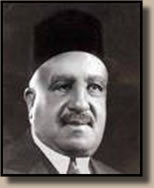|
The only thing this unique newspaper did not publish was commercial advertising in all its forms, so that it does not find itself hostage to advertisers and to maintain its intellectual independence. Only in very rare occasions, did Eltaher publish advertising in support of nationalist projects such as advertisement for the Egyptian Spinning and Weaving Company, a subsidiary of Banque Misr (The Bank of Egypt)12.
|
Talaat Harb Pasha
Founder of the Banque Misr group
of companies in 1930 |
Hence the newspaper’s financial resources were extremely limited and consisted mainly of subscriptions from its supporting readership, even though some subscribers still managed to receive the paper without paying for their subscription!
Soon enough the colonial powers got wind of this newspaper and did not waste time fighting it either directly or through their Arab and Muslim proxies, and eventually succeeded in stopping its publication. The British Mandatory authorities in Palestine were also partially successful in preventing the paper from being distributed in Palestine.
Occasionally Eltaher succeeded in circumventing the ban on his newspaper and the seizure of its issues in Egypt and other countries by resorting to a number of stratagems. Sometimes he published the newspaper under other names such as “Al-Minhaj” and “Al-Nas”. Otherwise he would wrap the newspaper with outer pages of Egyptian papers appearing in foreign languages such as “The Egyptian Gazette” and the French language daily "Le Progrès Égyptien". Occasionally he would mail the paper in bulk to friends, acquaintances and relatives in Europe, who would then wrap the paper in some of these countries’ papers and re-mail them to various Arab and Islamic countries
where his newspaper was banned.
Another obstacle facing nationalist newspapers was that import of newsprint was monopolised by companies owned by groups decidedly against the nationalist current, especially supporters of Zionism13 vis-à-vis Palestine. By refusing to sell newsprint to those they did not like, they were partially able to curtail their freedom of speech.
One time he proceeded to use large manila envelopes similar to those used by the British Government, and had them printed with the then official inscription “On His Majesty’s Service”, and used them to mail his paper. Despite all these restrictions and occasional seizures, there was a common saying among Arab nationalist circles at that time: “The sun never set on two things: The British Empire, and the newspaper published by Mohamed Ali Eltaher”.
|

